|
Posted by Romy the Cat on
01-12-2006
|
viagra recenze viagra cena A few years ago playing with my favorite Vitavox S2 driver I was asking myself how it might sound if instead of the Alnico magnet the electromagnets would be used. As many other driver of the period the Vitavox did not utilized the only one magnet type. There was at least 3-4 different Alnico composition and they all sounded quite different. Still, I was always wondering how Vitavox S2 might sound it gap would be magnetized with a field coil or with the combination of a permanent magnet and electromagnet. One of the objective of my was to deal with Vitavox S2 upper frequency idiosyncrasy (people who use the S2 within the better setups know what I am talking about) I hope that the electromagnets might change the certain ways the Vitavox S2 behaves at the very top as my experiments with electromagnets in past suggested me that from this perspective the electromagnet could be a fruitful direction
In my past I spent quite some time with Telefunkens, Supravox and Klangfilms electromagnet drivers and although I did not fide them interesting I always noted that they behave very different when they were stressed. The drivers responded with dynamics but they at the same time went to some kind of very interesting softness. The harder I drove them the softer they responded… very interesting… and when they entered into distortion the did it very gently and very not annoying… All the rest “glorified” characteristics of the electromagnets driver do not exist; at least I was not able to recognize them. What I mean that the better or worst characteristics do exist but they are the properties of the specific driver and have no explicit relation to the fact that the driver magnetized by a field coil.
It is virtually imposable to talk with audio people about field coils. When the audio morons hear a field coil driver they instantaneously dive into the intellectual coma and begin come up with absolutely ridicules explanations and justifications of what they are hearing… regardless of the reality of the actual sound. I have seen again and again how very ordinary or even completely faulty sound were admired and hyped juts because the listeners were told that the drivers used electromagnets. I remember that at CES 2003, when David Karmeli played his Klangfilm Bionor (demonstrating quite off the mark sound) the army of the cretins expanded that “those speakers sounded so wonderful because you can not beat the field coil”. The irony was that Karmeli’s Bionors did not even use the field coils. Ironicly, another friend on mine who do have the electromagnet version of the Klangfilm Bionor has very inferior sound to the Bionors with the permanents magnets… The very same situation repaid itself agene and agene: people do not use the electromagnets consciousnessly do not approach the sound of the field coil drivers objectively and consciousnessly. Look at the inadequate sound that comes from the Shindo, Western Electric, Supravox and you get what I’m coming from.
Still, I do not think that there is anything wrong with the electromagnets. All those intellectual justifications that people use with electromagnets (more powerful magnetic force, higher resolution and so on) have hardly anything to do with sound. In fact those justifications in reality are always mistaken, I did checked them out… Based upon my experiments with electromagnets I have my own theory about them, the theory that is NOT backed up with any positive and tangible results so far. So, what I was thinking is to contribute one of my Vitavox S2 drivers for a conversion it to electromagnet. I have a good mechanic in my disposal and a guy who could wind the coil… so why not? I really do not know that results I might end up with and it would be a soft of a journey-project… The good part (the most important part in my view) that I will be starting from a driver that initially already has a very good diaphragm, phase-plug, compression model, outtake channels implementations and the very proven sound. I will be slowly posting about my progress and please if you have any thoughts about the electromagnet implementation that feel free to share them.
Rgs,
Romy the Cat
|
|
|
|
Posted by cv on
01-12-2006
|
cialis cena 2018 cialis dr max Well, without any theory or gut feeling to guide us, we are flailing around. So let me tell you what my instincts tell me and you can take it or leave it.
I think the main advantage of the EM is reducing flux modulation. There was a post recently by one of the attendees who went with Feastrex claiming that Dr Kilppel (of famous measurement tools suite) measured one of their drivers and it featured the lowest level of flux modulation he'd seen yet. With that in mind: you can think of the voicecoil and field coil as forming a primary and secondary of a transformer.
To reduce flux modulation to a minimum, I wonder if one would like the secondary (field coil) and power supply to have as low an impedance as possible, ie resembling a shortiing ring.
This point of view might imply that:
1) Lower resistance field coils and supplies might sound better than high impedance (one could actually test this by comparing the RCA 1428 and 1443, which are identical save for FC voltage)
- here's are my new ideas
2) Use a FC supply having a negative impedance to offset as much of the DCR of the coil as possible (til you get stability problems)
3) Presumably we need to maintain good behaviour at HF as well, in which case, do we want to layer the FC windings in order to reduce interwinding capacitance - ie much as if we were designing an anode choke etc. Need to balance this with the reduction in flux available and reduced heatsinking.
You can also take the following with a pinch of salt, but people have reported drivers sounding better with a SlA battery supply rather than a bench one., so much so that they are willing to string 10 or 20 in series to get the required voltages.
Anyway, this is an exciting (pardon the pun) project, look forward to hearing how you get on cos I would love to try this myself.
|
|
|
|
Posted by Romy the Cat on
01-12-2006
|
discount drug coupons cialis free sample coupons redirect  cv wrote: cv wrote: | | I think the main advantage of the EM is reducing flux modulation. There was a post recently by one of the attendees who went with Feastrex claiming that Dr Kilppel (of famous measurement tools suite) measured one of their drivers and it featured the lowest level of flux modulation he'd seen yet. With that in mind: you can think of the voicecoil and field coil as forming a primary and secondary of a transformer. |
|
Well, I think, we have to be very careful with it and the things are not what they are. People like to talk about the redaction of flux modulation then unfortunately they are juts the smalltalk. I personally feel that the sonic softness of the electromagnets in fact come form the very heavy flux modulation of the electromagnets. The electromagnets, as I see it, have no instantaneous bufferness to hold the magnetic modulations coming form the voice coil and therefore they “dive” when the short blast of signal run across the VC. In my excrement I was thinking to have a combination of the small permanent magnet that would deliver 10-15% of magnetic force and the rest coming form the field coil. I would like to have some “code” in the “transformer”. Also, I do not know is the deduction of the flux modulation is completely positive direction to do go: did you try to drive a car with too stiff suspension and over-inflated tires? Also, I do not know about the Feastrex. The sounded phenomenally horrible, regardless the flux modulation level they had. I wonder what credibility the Feastrex people might have if they deliberately ended up with THAT sound, regardless if it come form the electromagnets or form other problems. (I comment very negatively about the Feastrex despite the fact that I do like Christopher Witmer and respect his devotion to that company, I juts do not play the games of moderation of my perception of the actual result by my relationship with the people)
 cv wrote: cv wrote: | | To reduce flux modulation to a minimum, I wonder if one would like the secondary (field coil) and power supply to have as low an impedance as possible, ie resembling a shortiing ring. |
|
Yes, I thought about it and it is how I would do it. I would also go for much higher voltage: ~50-100. The Cogent gays went for 12V and use the Radios Shack PS. I do not know what motivated them to stay with 12V, perhaps Steve dug it in some OK RCA manual that they used 12V and imitates it. I remember when I experiment with the supplies for my old field coils it was quite affective to the drivers sound…
 cv wrote: cv wrote: | | 2) Use a FC supply having a negative impedance to offset as much of the DCR of the coil as possible (til you get stability problems) |
|
3) Presumably we need to maintain good behaviour at HF as well, in which case, do we want to layer the FC windings in order to reduce interwinding capacitance - ie much as if we were designing an anode choke etc. Need to balance this with the reduction in flux available and reduced heatsinking.
Hm, this is very interesting… I have to think about it….
 cv wrote: cv wrote: | | You can also take the following with a pinch of salt, but people have reported drivers sounding better with a SlA battery supply rather than a bench one., so much so that they are willing to string 10 or 20 in series to get the required voltages. |
|
It might be correct. I remember that the size of the last cap in the DC supply for my magnetizing coils was affecting sound and the larger I when with that last cap (it was CRC filer) then “harder” sound was…
The caT
|
|
|
|
Posted by cv on
01-12-2006
|
|
Allo
I didn't say this explicitly but the audibility of the power supply might support the theories about the flux modulation being bucked by the combo of coil and PS.
I mostly wanted to mention the layering idea and - ah yes, that was it: see if you can source rectangular section magnet wire to wind the coils with. Without thinking about it in depth, I think this may give you the best heatsinking and better fill factor/DCR relative to circular conductors.
Actually, if heatsinking is an issue, you can probaby saturate the coil and cavity with ferrofluid :-O
Might be expensive and have no benefit whatsoever of course...
Quick question: why do you think 50-100V is important? The magnetic field will be determined by the number of turns x the current. More turns = thinner wire, higher resistance so less current. I will have to do the sums but it may be that the flux vs heat tradeoff is better as you increase the current. Certainly the lower impedance coils will have less self-capacitance and may buck the flux better.
I suspect this or other considerations drove Steve's decision more than blind imitation of the RCA (which, as I mentioned, was available in 117V version).
cheers
|
|
|
|
Posted by Romy the Cat on
01-12-2006
|
|
Very interesting… Earl Geddes just posted his thoughts for the Morons at the AA. I do not know is he was inspired by my post of by the completely foolish nose that the AA’s idiots razed around the Cogent’s Steve and Rich experiments but still – it was a good timing…
Earl Geddes wrote:
"Could someone explain to me the theory behind the use of field coils in loudspeakers. And please, don't just say that "they simply sound better". Please leave that kind of comment to for wires.
The only reasonable comment that I heard was that they reduce flux modulation, but that doesn't hold water.
They will reduce flux modulation over a ceramic magnet, and perhaps even an ALNICO magnet, BUT NOT over a well designed flux modulation ring. The internal impedance of the field coil is much higher than the ring and thats if it is terminated by a very low source impedance power supply.
And the cleaness of the power supply! Don't get me started on that. Can you say Lots-O-Dollars?
Since most compression drivers have saturated magnet structures its not possible to get more flux in the gap no matter how high the currect through the coil.
So I'm at a loss to see an advantage. When all one can say is "Hey they sound great" this usually turns out to be a myth when the smoke clears.
There were very good reasons that they went away many years ago and I don't see how things have changed.
There ARE very good reasons to use ALNICO over ceramic or Neo, and Samarium Cobolt would be even better - I discussed these aspects in my book. But I fail to see any advantage to a field coil. And I'm also not convinced that the difference in magnets is all that audbile either. We did a test of a ceramic magnet compression driver and a massive ALNICO one in otherwise identical systems. The differences were small enough to be statistically insignificant, but the trend was for the ceramic one (and of course this test was blind).
So any thoughts on the theory?"
I think that Earl in correct in his observations. If (big if) the advantages of electromagnets do exist then we do not know what they are and how it relates (if they do) to the flux modulation. The extra flux is fine nit it make the flux “too stiff”. I have heard a few drivers with 2.4T in gap and all of them sound like crap. Evan with electromagnet when you raise voltage and generate more flux the driver begins to sound very-very bad. Actually the stories of the more powerful flux are kind of bogus generally and good enough only for “AA-level of intelligence”. The Cogent’s Steve and Rich drive their MF compression driver at 108dB. Well, with 100% of efficiency 1W applied to a perfectly saturated gap should give up 111dB sensitively, so, where they lost the 3dB? Perhaps in the under-magnetizing the gap? If convert my S2 driver into the field coil I would do the very much the same to drive the magnet very soft….
Theoretically, yes, when we juts shut down the magnetizing machines we do loose the large amount of magnetic power right there, so what? Get bigger magnet!
I do not know any advantages because the fact that the sound softer. I personally believe that the electromagnets have HIGHER MOMENTUM FLUX MODULATION and that make them to “sit” slightly… or exactly what I would like to get out of the Vitavox S2 drivers that is very colorful and very contrasty and might be benefited slightly from a very mild “gentleisarion”…
Rgs,
Romy
|
|
|
|
Posted by N-set on
01-12-2006
|
acheter nifedipine 20mg nifedipine topique click nifedipine lexapro and weed lexapro and weed
I know almost nothing about the relation between sonical effect and
physics, so I will only try to speak about the latter. Take it as you
wish, I can as well delete the post if it just increases the
entropy.
Chris, I think your point 3) is contradictory with the assumption of
low impedance - think of it, why we do it in the audio coils...exactly
to have broadband high impedance, but that's why I'd support it :-)At
the level of a crude approximation I see it this way: signal current
flowing in the voice coil produces magnetic field (B), caught (to some
extent) by the FC (now I neglect the effect of the VC field on the
pole-piece). This field generates voltage in the coil. Since FC would
rather have a lot of turns and a relatively big diameter, I susspect,
just like you, that this coupling is not negligeble. Then, if the PS
has low impedance for the given frequencies, the induced voltage would
cause a high current flow in the FC, producing in turn stronger
signal-related addition to the constant magnetizing field. That's why I
think that high impedance PS is better, as it blocks the signal
"intrusion" into the FC supply. I would even try adding some additional
gapped choke in the PS, to present even higher imp. to the
signal-induced voltage (Chris, you can try it with your FC's)....unless I got it all wrong
I do not quite get Romyś analogies on the "stiffness" of
electromagnets. As we once agreed with Chris (unless he has changed his
mind :-), deeeep saturation, at least on the paper looks just
wonderful, for the reasons we all know. Roman, your earlier observations with
underfed FC are very interesting. A question would be - were the
pole-pieces of the drivers you have tested really deep saturated?To
judge that, one would have to know the exact material and the B field
in the motor. It *might* have been that the operating point of the
pole-piece was idiotically chosen by the designer/manufacturer right on
the knee of the magnetic curve, where the non-linearity is the biggest,
but one gets high Teslas without wasting too much currebt for the
FC...this scenario is just a speculation, as I have never calculated
that for the existing drivers... Then, lowering DC moves the op. point
lower, to more linear region and hence it might be more benefical than
the higher sensitivity reached at the price of magnetic linearity....as
said, just a though...probably stupid.
Your new observations on rising the voltage, which I just appeared when
I was writting this post are even more interesting :-/ I think to try
to establish the link between physics and sonics in this case, we must
have more concrete data: what is the magnetic material used, at which
point it operates, what is the strongest signal we can expect in the
VC. Then we can try to judge if the motor stays really saturated under
ALL real circumstances, or is it just saturated at no- or low-signal,
lab conditions?
As for the perm. + FC combo, I would be very, very careful, especially
with simply winding the coil around the existing Alnico magnet. I dont
remember the histeresis loops of Alnico (Chris, you lucky dog, you have
Bozorth - maybe he has those curves), but permanent magnets are usually
much less linear than soft magnets and on top have wide loops. Both
facts matter a lot if you dont want to saturate the motor. Leaving
linearity aside, wider loop=bigger losses, so the signal, remagnetising
the magnet via the VC, gets attenuated. Permendure is usually used to
get big Teslas, but I wonder about it's linearity at the saturation
region- it seems to have a sharp knee (at least at those curves I have
seen). It would have to be driven either at the most linear,
unsaturated part (like in AN cartriges???) but then we loose quite some
Teslas, or very deeply saturated, so that even very strong VC signal
doesnt bring it back close to the knee. I once tried to get the
attention of the AA crowd to the magnetic linearity problem and
suggested to perhaps sacrifice some dB/W/m for more linear magnets, but
the satanic crowd shouted in their orgy
Permendure!Permendure!Teslas!Teslas!
Cheers,
N-set
|
|
|
|
Posted by MochaMike on
01-12-2006
|
prednisolon bivirkninger prednisolon og alkohol go  Romy the Cat wrote: Romy the Cat wrote: | |
I do not know any advantages because the fact that the sound softer. I personally believe that the electromagnets have HIGHER MOMENTUM FLUX MODULATION and that make them to “sit” slightly… or exactly what I would like to get out of the Vitavox S2 drivers that is very colorful and very contrasty and might be benefited slightly from a very mild “gentleisarion”… Rgs,
Romy |
|
The advantage I have found with field coil ( I have around 20 different field coil drivers here many are custom experiment power supplies from 12 to 300 volt) magnet is the tuning available with on-the-fly current/ flux density adjustment - this is with paper cone 4 to 15" drivers not compression drivers - I have to say they can sound quite good. Not soft - softness to me is found in alnico drivers - field coil is 'liquid' or 'easy' to listen to but will sound hard when it is in the recording where alnico can sound compressed or 'nice' when it is supposed to sound hard - regardless I do not listen to them because I feel a properly utilized coaxial is better overall soloution (even with ceramic nasties) and there are no available field coil coaxials.
Added By Romy in a few weeks: The user turned out to be Mike Bates (know as Magnetar at AA). This humane waste is not alowed at my forum and therefore since I learned who it was the MochaMike is no more.
|
|
|
|
Posted by guy sergeant on
01-12-2006
|
In the case of the Audio Note field coil cartridge the field strength (and hence output) was significantly less than that from the permanent (AlNiCo) magnet equipped Io. Yet the performance of the field coil version (Io Ltd) was 100x better despite all of the other parts being identical. It isn't about field strength per se but seems to be about how the field behaves and replenishes itself once bent out of shape.
(If anyone has one of these cartridges lying about unloved & unwanted please let me know. Horrible brown thing with 6 pins on the back.)
It may also be worth looking at whether you need a constant voltage or constant current power supply.
For those less sure about the content of this thread, some explanation of the theory is at herehttp://home5.inet.tele.dk/f-hammer/
I'll certainly be interested to hear how the field coil S2 can be made to sound.
best regards
Guy
|
|
|
|
Posted by Romy the Cat on
01-12-2006
|
abortion pill usa buy abortion pill anvly.com abortion pill usa legal MochaMike, yes you are correct it would not be the “softness” but rather”liquidity”. Still what you are taking is applicable for the paper cone 4 to 15" drivers not compression drivers. Who knows how the compression drivers will react.
To the rest folks...
Flasks. I really do not know how the electromagnet will behave and how it might sound. I have nailed down for the project the following objectives:
1) Trying to deal with some very specific Vitavox S2 characteristic by levering the magnetic force and consequentially dumpling the cone by this. I really do not care about the dropping the sensitively of the driver as I have 12dB to burn in the Super Milq upper frequency channel.
2) Investigating if I would be able to find “different” current PS for the S2’s electromagnet in order to “liquidity” the S2 upper region.
3) Investigating if the rearmament S2 magnet combined with complementary field coil might be an interesting direction to go.
4) Eventually trying my long time idea of active modulation. The idea consists of having 2 field coils modulating 10% and 90% of the magnetic force (or 10% field coil and 90% of the permanent magnet). The 90% coil is driven by a DC power supply. The 10% coil (or even less) is driven from a regulator 6C19P/6C33C with an ultra fast aerial amplifier (around a HF penthod) and using the source form the Melquiades output. The idea is to see if by binding the magnetizing current in the real time would provide any interesting effect. Theoretically by increasing the spread of the regulator and minimizing the size of the 10% coil it might be possible not only completely compensate the flux modulation but also to gain some dynamic. It would be cool to try to souse the field coil regulator form a different dedicated amp and to delay the main amp.. Here we go…. fantasies, fantasies ….
Anyhow, this all juts theories and I really do not know if it all worth to try. I took the S2 apart (the pictures will be posting soon) and tried to come up with the concept how the field coil might be implemented. Men, not I can seen what the Cogent’s boys when there and how much work it might be, even if I have the driver base is ready to go.
Rgs,
The caT
|
|
|
|
Posted by Romy the Cat on
01-12-2006
|
|
Wow, it took 3 hours to take it apart. As I always told those vintage driver made horrible. The do sound Ok but precession-wise and technology wise they were very pure. They really were the low teach devised made for popping up the sound pressure but for the contemporary high demands home installation the vintage drivers might be done way more interesting… of could if the people who do them have ears and taste…
The Vitavox S2 is not an exemption and some of its; aspects are very purely done (also it is still the very best sounding MF driver). For instance the centering of the center poll is very bogus and very not precise… no surprise that some people suffer from it..
Anyhow, here are the Vitavox S2 guts.
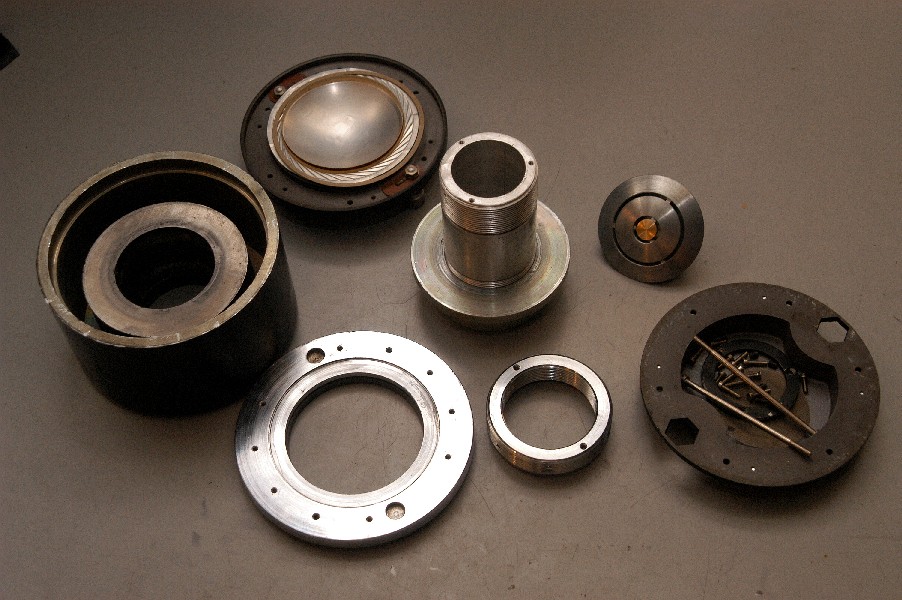
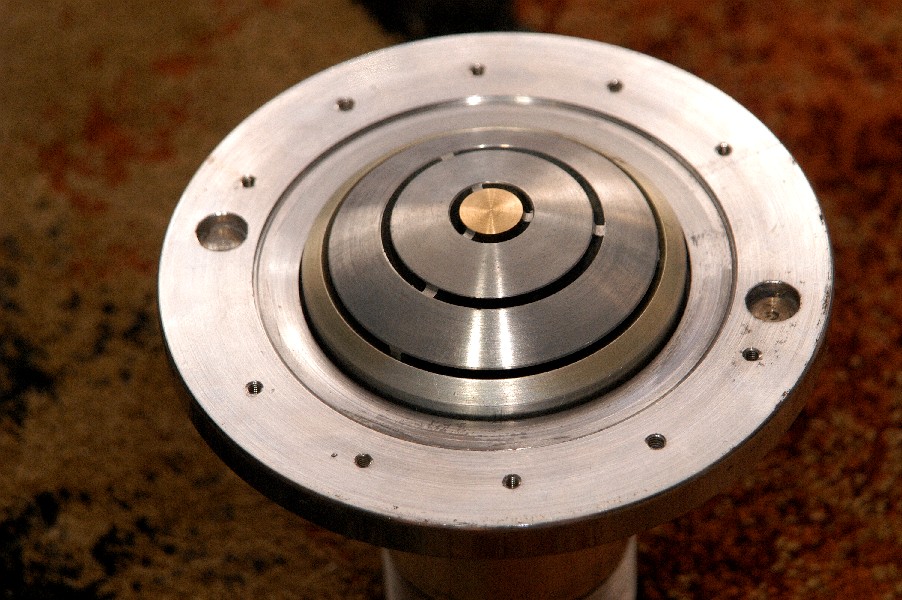
|
|
|
|
Posted by cv on
01-13-2006
|
melatonin pregnancy first trimester melatonin and pregnancy Thanks for the picture Romy. I couldn't unscrew the top threaded piece myself. Perhaps I was turning it the wrong way?! Any guidance you could give on dismantling the driver would be appreciated.
Regarding the active flux modulation idea; I think you would definitely need a low self-capacitance coil for this. But if it's just a few turns, you may not need to layer it.
The "liquidity" of sound is something I'm aiming for too; I heard this in the Eckmiller field coils and it's a characteristic the very best OPT transformers provide too.
cheers
cv
PS N-Set, missed your post earlier. Drop me a PM (and happy new year btw!).
|
|
|
|
Posted by Romy the Cat on
01-14-2006
|
 cv wrote: cv wrote: | | I couldn't unscrew the top threaded piece myself. Perhaps I was turning it the wrong way?! Any guidance you could give on dismantling the driver would be appreciated. |
|
Chris,
To take the outer ring is very simple. Uncrew 3 bolt (hex) at the rind, drop a few drop of low viscosity oil in the threads, wait for few hours, then hold the threads with a leaser glove and unscrew it. Any S2 driver hat I tried did dive up … except the one that I am experimenting not with conversion. With this drive to take the outer ring I bought a simple tool in the local shop…
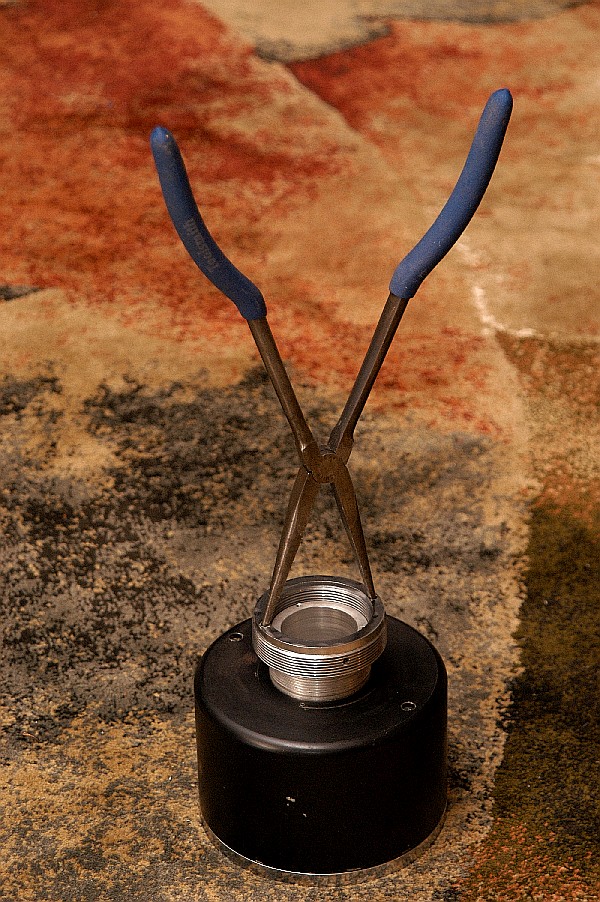
Here are some further observations about the prospect of the S2 redesign.
Looking careful and trying to visualize how the new S2 might look like, behave and to be assembled I release that convert the S2 with electromagnet is juts fraction of the tasks. There are many other aspects that I would like to make available in that new S2 driver. The realty is that with field coil the driver become much more simple and much more manageable. For instance I would like to have an options to slightly modify the compression, change the inner-channel rate from ~180Hz to 385Hz and few other things. It would not be difficult to do but there are many variables with completely unknown consequences. The intellectual logic that I might or not might use while I think about the new driver design has hardly any relation to the sonic results of the driver, or at least I am not familiar with this pattern. The very good part is that I have already “default” diaphragm, gap and phase plug assembly that that will provide the base sound of the driver.
I am not a bit fan of the thinking that if the driver uses electromagnet that it instantaneously become a good driver, perhaps the reality would be quite opposite practically for HF drivers. I think is I finish this project, (or if I start it) then it will be the driver that will sound “differed” and this difference would not derive only form the fact that the driver would have a field coil. What I am optimistic is to have a driver what I would be able to tune it sound to my demands playing with the magnetic force, the permeability of the core (this is a big question), type and the amplitude of the power supply, compression ratio and few other things. Who know, might be I will be able to tune the drive to something that was not available before, thanks the S2’s cone and the phase plug are a wonderful playground for experiments. Or perhaps with the new S2 design I will be able to manage the craziness of the vintage S2 cone with the metal suspension….
Who know…
The Cat
|
|
|
|
Posted by Romy the Cat on
01-15-2006
|
strattera prescription strattera generic price
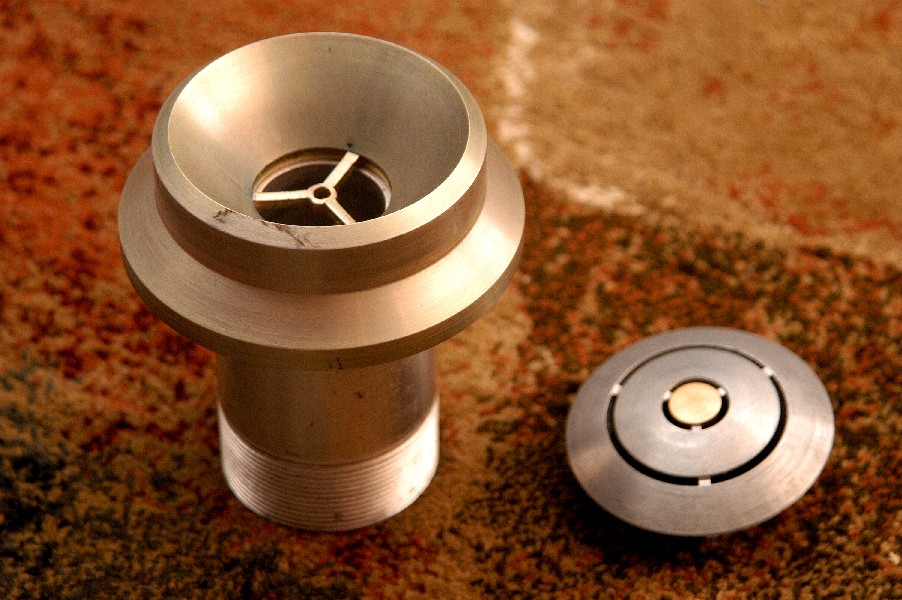
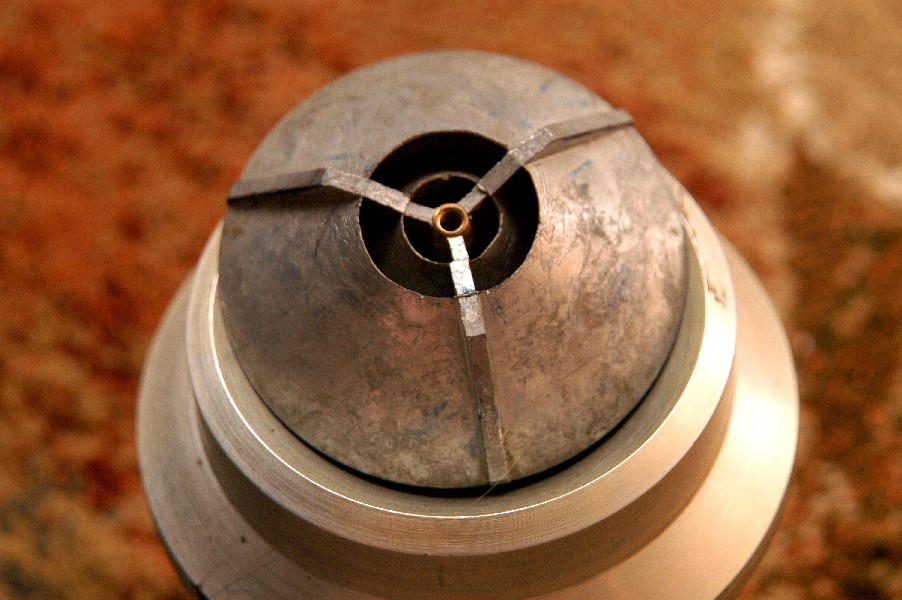
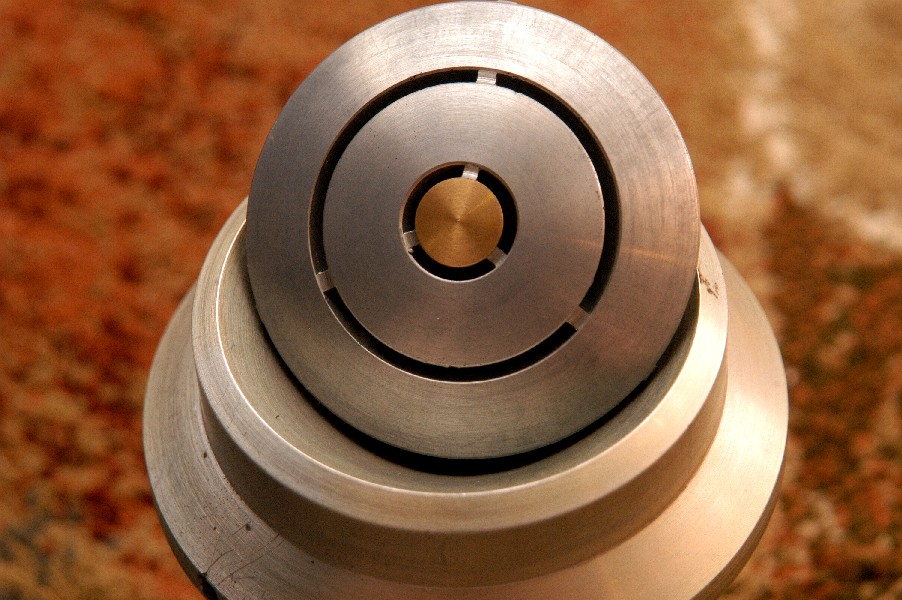
|
|
|
|
Posted by jweiss on
01-19-2006
|
Hi Romy,
It was good to finally meet you at CES at the Cogent Room. I guess that you really found Steve and Rich's drivers pretty interesting (you initially wanted to buy a pair of the midrange drivers, remember?) It would seem from all the activity on your website that you now want to convert your own Vitavox to field coils, just as Dr. Edgar is trying to do with vintage JBL and Altec drivers. Would you like to comment on what exactly you liked so much in the Cogent room that made you want to take this experimental path?
Thanks too for the CD of the material you played for Rich and I in the Cogent room. Rich sent me a copy over the weekend. I greatly appreciate that.
Look forward to coming for a visit to Boston in the Springtime.
Jonathan Weiss
|
|
|
|
Posted by Romy the Cat on
01-19-2006
|
buy naltrexone online buy naltrexone online canada open tylenol and pregnancy category tylenol and pregnancy  jweiss wrote: jweiss wrote: | | It was good to finally meet you at CES at the Cogent Room. I guess that you really found Steve and Rich's drivers pretty interesting (you initially wanted to buy a pair of the midrange drivers, remember?) |
|
Hi, Jonathan. Yes, I was quite curious about the Cogent results before the CES. I am glad that I head them, and although I do not completely like what I heard but still, it was a multifaceted educational experience. I do not know if you have seen it but my observations regarding the Cogent’ sound at CES available at:
http://www.goodsoundclub.com/TreeItem.aspx?postID=1922#1922
 jweiss wrote: jweiss wrote: | | It would seem from all the activity on your website that you now want to convert your own Vitavox to field coils, just as Dr. Edgar is trying to do with vintage JBL and Altec drivers. Would you like to comment on what exactly you liked so much in the Cogent room that made you want to take this experimental path? |
|
Well, ironically it is not “exactly I liked so much in the Cogent room” motivated me to try an electromagnetic driver. Rather opposite: what I did not heard at the Cogent’s sound that motivated me and it made me wonder to see if anything is available in this direction. You see, I dealt with electromagnetic in past and generally I did not like what I’ve got, I never dealt with the electromagnetic compression drivers though… I had long time ago an objective to try an electromagnetic compression driver, preferably with a combined magnet featuring a filed coil AND permanent magnet but I clearly had and have a point of reference what I might lead into.
http://www.goodsoundclub.com/TreeItem.aspx?postID=929#929
I thought the Cogent’s efforts would give me an idea. In a way they did and at the same time they did not. The reasons why I was not satisfied with the Cogent’s results was not because their sound was good or bad (this is secondary) but because the Steve’s and Rich’s efforts do not answer the actual question about the benefits or shortcomings of the electromagnetic solutions for compression drivers. You see, the sound that Cogent got out of their drivers (let disregard the inadequate horns) was not because the electromagnetic. There are dozens different criteria why a driver sound in the way that it sounds and the type of magnet used is juts one of them. Cogent did own driver, with own cone, own suspension, own compression scenario, own wave-guides, own phase plug and many other “own” things and the combination of all those things is responsible for the sound that Cogent got. The filed coil contribution is might be proportionally negligible, or I would more correctly say… unknown. I personally, a little caution that in their design thay went for an imitation of the old RCA driver. Those old vintage driver… all of them are very-very poor and I’m for a long time am a vocal and persistent opponent of the brainless admiration of the “vintageism”. The only good ingredients that some of the vintage drivers had, were some of the materials that they used. Instead of the using the same materials but with the better design the Cogent guys went for an imitation of the same vintage compromised topology but with the “other” materials. I do not think that it is a fruitfully direction.
I do not know what Dr. Edgar is trying to do with vintage JBL and Altec drivers. I think that the audio-Morons will eventually crated a bogus empty-based exuberance around electromagnetic drivers and people like Dr. Edgar would cash on selling to their mostly Moronic customers the “new” Titan III version. It would not be difficult: a crappy “pressurizing” sound, a new strategically deployed article groundlessly praising the filed coils and an article of a drooling idiot-reviewers would be very sufficient for the cretins around this country begin to dump the permanent magnet driver and to but into the electromagnets…. It dose not mean the Burse personally do not understand what might be done with JBL and Altec drivers or can’t appreciate the good result but unfortunately when you mention the Dr. Edgar’s efforts you do not refer to him personally but to the crap that he makes available for his mostly idiotic customers. I kind of understand him. If my loudspeakers would be sitting in the rooms of the humane waste like Ed Sawyer, Rod Morris and the rest of "The List" then I would probably make my loudspeakers to sprinkle the Hydrogen Cyanide out of horn, killing that audio-dirt, preferably along with whoever ever approach their homes…
Anyhow, my personal objectives in electromagnetic are much moderate and are very specific. I would like under no circumstance deviate from the current Vitavox S2 sound by keeping the diaphragm, suspension and phase plug (the core of any compression driver) completely unchanged. I like very much the result it does now and I consider it a reference result. All that I would like to do is to eliminate a very specific design shortcoming that I feel the S2 driver has (get rid of the pre-phase plug ledge) and to introduce a filed coil to this driver (or perhaps a combined magnet). I feel that this experiment would be more indicative about the benefits or weakness of the electromagnets. I will post my comments about the result I get out of electromagnets on my S2 driver and if they will be positive then I have a very definitive further re-design of the Vitavox S2 driver, converting it into 3-4 polls driver with 380Hz horn rate.
 jweiss wrote: jweiss wrote: | | Look forward to coming for a visit to Boston in the Springtime. |
|
Sure, I will be glad to have you over…
Rgs,
Romy the Cat
PS: BTW, you posted in a wrong thread and I moved it to a correct one. I hope you do not mind...
|
|
|
|
Posted by Romy the Cat on
01-20-2006
|
nifedipine lp 20 acheter nifedipine 10mg Lately the Vitavox electromagnet project looks like moved to a fruitful direction. Well, I do not know if the direction would be a real fertile but it will be going somewhere instead of talking… that is always fruitful. I have quite good support form anyone with whom I referred with inquiries regarding my Vitavox fieldcoil projects. The good part is that no one knows anything defiantly and everyone very much would like to see what the final observation and conclusions regarding the fieldcoil benefits I will be. So, do I….
Below are the images illustrating how it will work at the first test-stage.
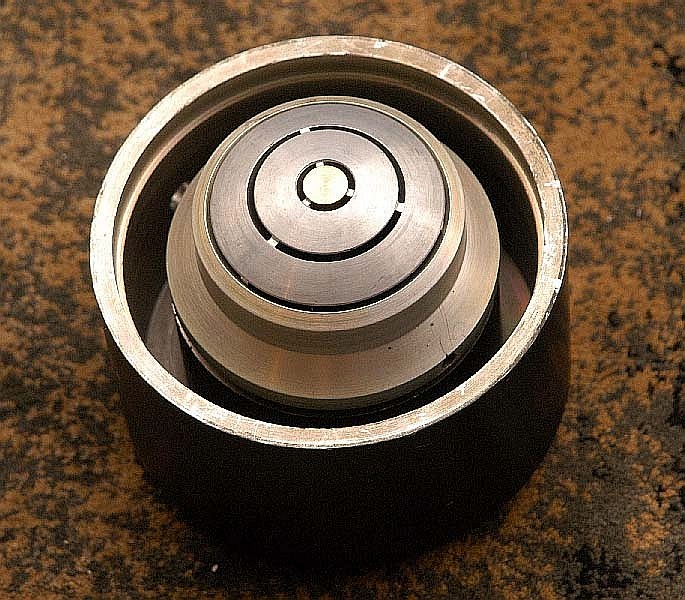
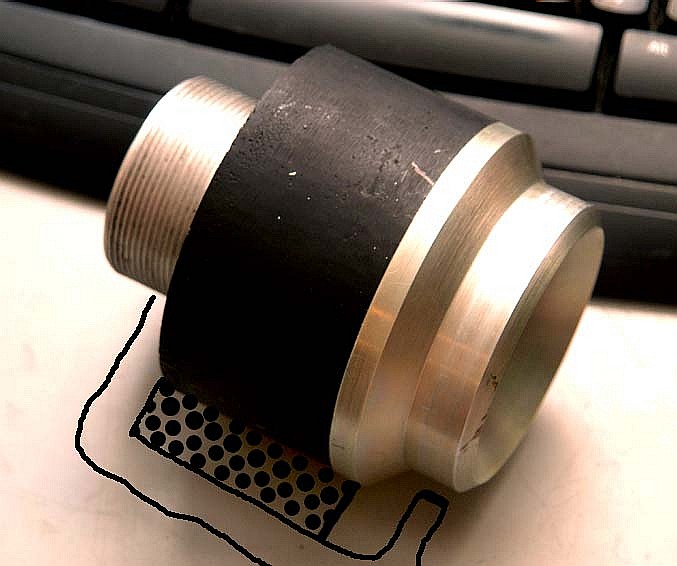
The first phase of the experiment would be an introduction of a filedcoil around a partially demagnetized permanent Alnico magnet and running them together, Then it will be a filedcoil around a normal metal none-magnetized core. The only unknown issue is that the DCR of the fieldcoil might be preferable. I will drive the coil with current, this is given. Initially I was planning to stay with sub 50V I order to use some large “transistor” filtering caps that I have in my storage. However, I afraid that I would lead to too small gauge of winding. Theoretically it would be possible to stat with low voltage… but that all depands … how to power the fieldcoil.
The powering of the fieldcoil is important and I remember that when I played with my fieldcoils it was quite affective, still they where full range drivers not the compression drivers. A common sense suggests that supply should be completely ripples-free and as close to DC as possible. It is not a big deal to make a 12-14V fieldcoil and buffer it with 5-7 Farades automobile capacitors. Still, how this “common sense” would relate to Sound I clearly have no idea. Besides, the hoodlims who foolishly adore the Telefunkens and Klangfilms from 30s do not know that they had up 5V ripples in their fieldcoils… Anyhow....in my care it will be obviously LCRC chain but the size of the last cap is the subject of the target voltage/current. Any idea or proposal how to power a fieldcoil and how it “might” affect sound?
Rgs,
Romy the Cat
|
|
|
|
Posted by guy sergeant on
03-24-2006
|
Hi Romy,
Have you made any further progress with this project yet?
best rgds,
Guy
|
|
|
|
Posted by Romy the Cat on
04-24-2006
|
 Romy the Cat wrote: Romy the Cat wrote: | Below are the images illustrating how it will work at the first test-stage.

|
|
Hey, I kind if did it….
The first draft of the experiment with Vitavox S2 driver is on. The idea to use a combination of permanent magnet and electromagnet was abandoned. The filed coil was calculated and built by Bud Purvine from Seattle’s Netics Ltd. The magnet core was manufactured from 12L14 material by Erickson Machine Shop out of Boston At 20V and 2.3A it runs approximately that same magnetic force as the Vitavox S2 has with a permanent magnet. I did not listen the thing yet and probably will not for a week or so. I will keep the readers of the site informed about the final results and conclusions and the measurements that I might be conducting. I would like to point out that it will be the only one know to me methodologically clean experiment if an electromagnet driver has any advantages over a permanent magnet as no other elements of the drives were changed.
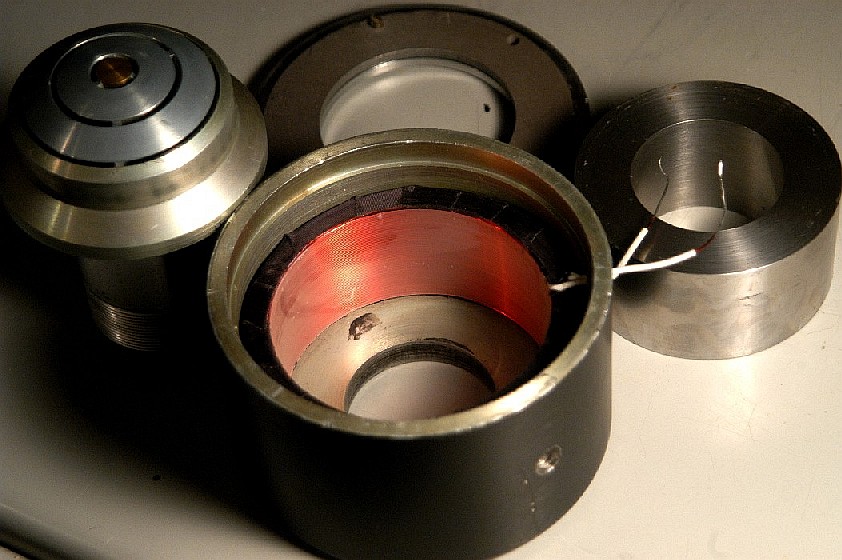
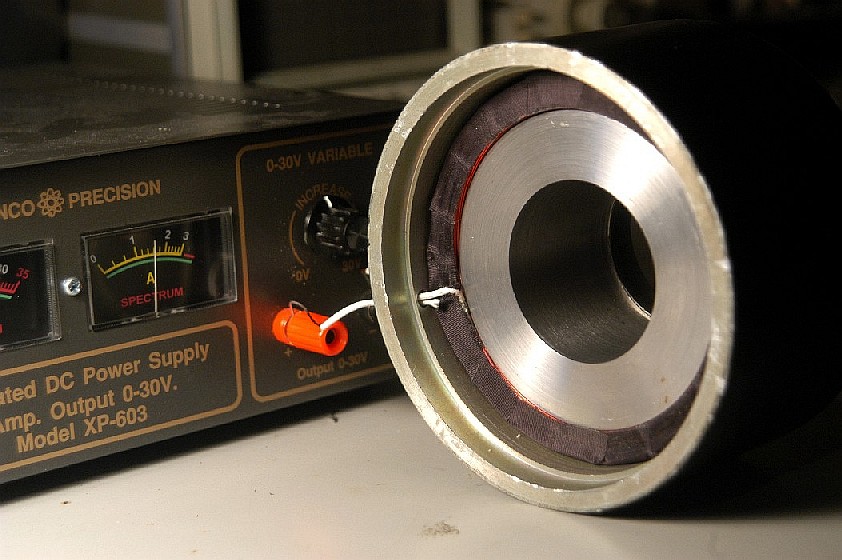
It will be fin to listen this thing…
Romy the caT
|
|
|
|
Posted by guy sergeant on
04-25-2006
|
Hi Romy,
That looks very promising. I can't wait to hear your impressions once it has been 'trained' to work in Macondo.
rgds,
Guy
|
|
|
|
Posted by Romy the Cat on
04-25-2006
|
|
The played today a little with Vitavox S2 driver with electromagnet and made some measurements. Measuring the relative magnetic force (I use Hirst GM04) I found out that increase current up to 3A linearly increases the magnetic force in the gap. I did not go over 3A but it looks like the core was quite far form susurration at 3A. Sonically the change of current also hugely affects sound, primary transient characteristic. I did not listen music and did not put driver in a horn but juts listened a few test cuts with naked driver at different currents. I do not know if it sounds good but I cat testify that it sounds VERY different at different currents. It sound more deferent then it might be predicted form the frequency sweeps that I provide below. I would withhold as this point from any judgmental comment and juts share the raw data.
Those sweeps (it is not 1W of course) were made by a naked driver sitting at 3 feet from my calibrated instrumental microphone. The first and the last sweeps as the Vitavox S2 drive with permanent magnet and the original metal suspension diaphragm. Do not be afraid of what you see: this is perfectly normal response of a naked driver that is not EQed by a horn. The sweeps were driven by the HF channel of Super Melquiades with 3700Hz high pass filer, first order. After the permanent magnet sweep was done the diaphragm with the back plate was detached and attached to the filed coil driver that was positioned into the very same location. Then the sweeps were made with the Vitavox S2 armed with electromagnet at the different currents.
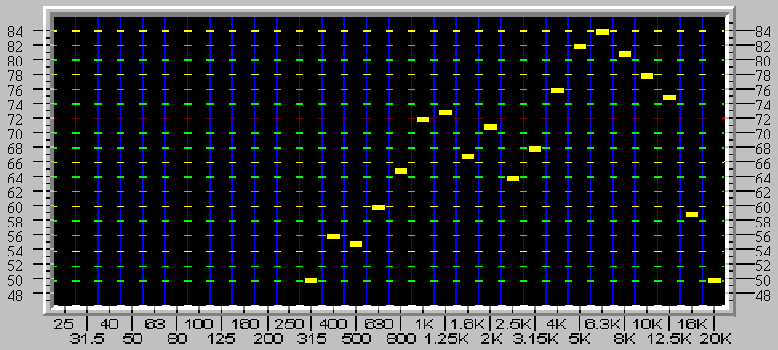
Above the S2 driver with a permanent Magnet
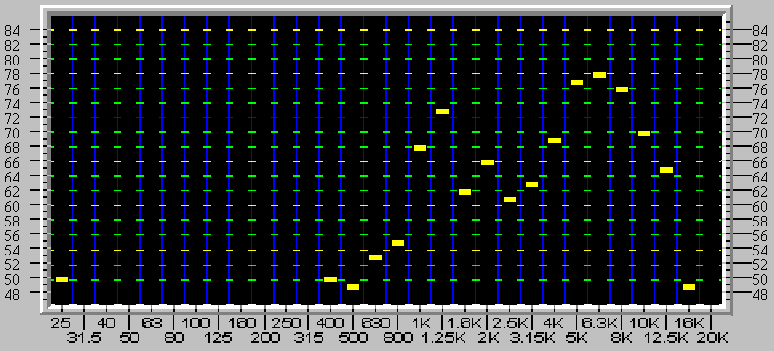
Above electromagnet at 0.6A
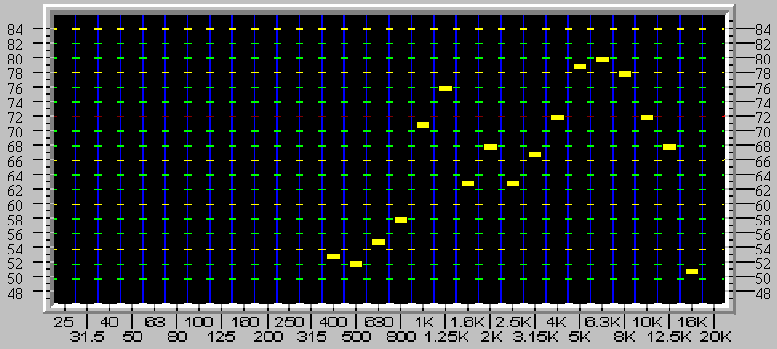
Above electromagnet at 1.0A
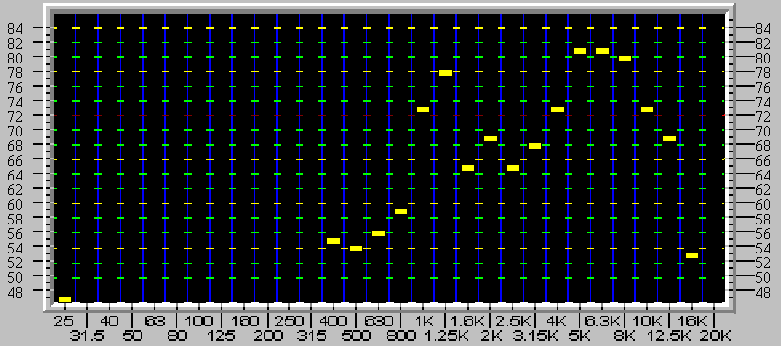
Above electromagnet at 1.4A
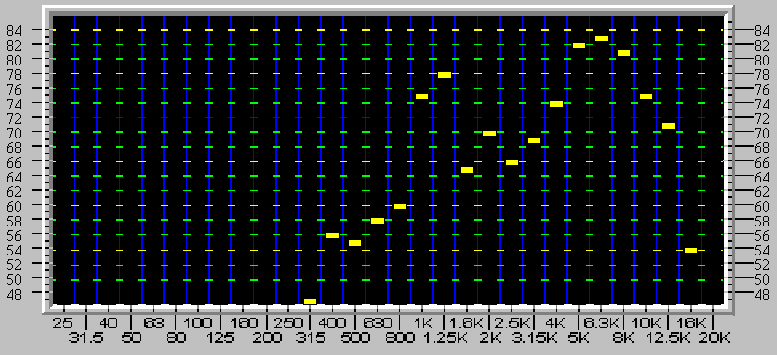
Above electromagnet at 1.6A
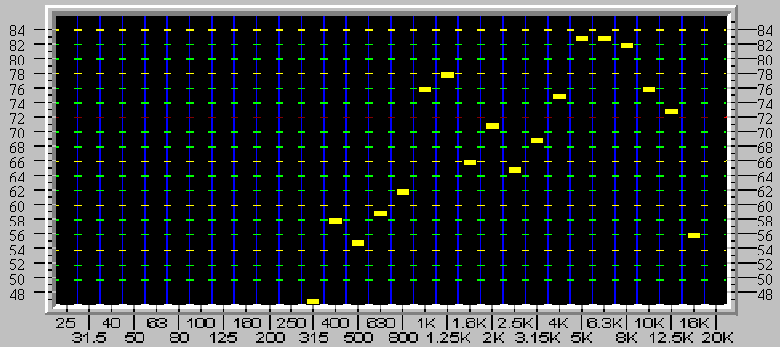
Above electromagnet at 2.0A
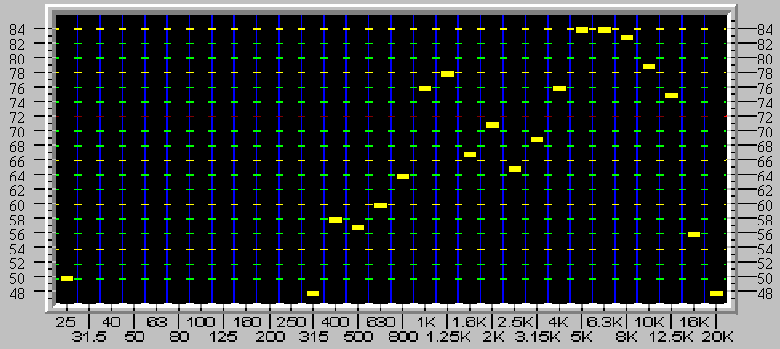
Above electromagnet at 3.0A

Above again the S2 driver with a permanent Magnet I will provide further listening assessments later on… when I have them….
Rgs,
Romy the Cat
|
|